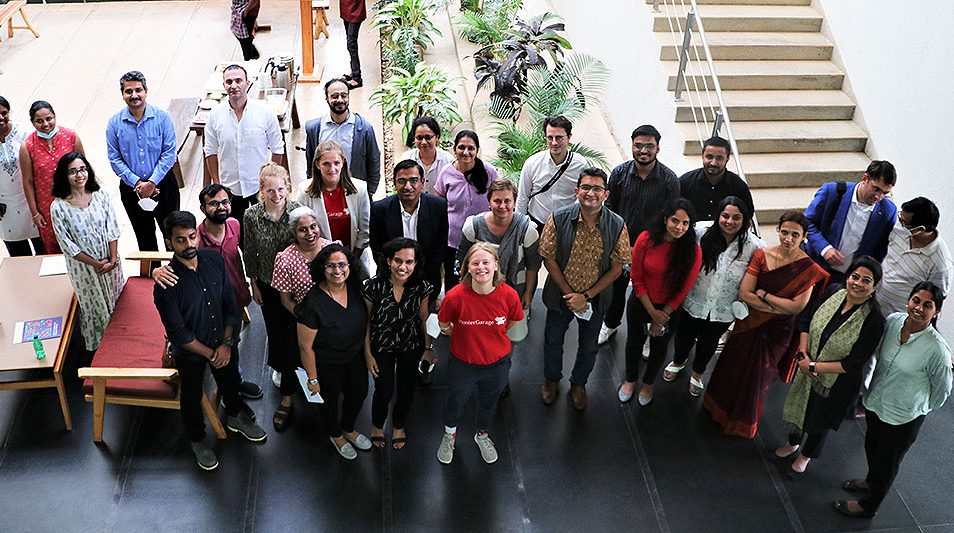Connecting Start-Ups Globally
 © CCAMP
© CCAMP
Scientific progress thrives on global cooperation. In 2022, the DWIH New Delhi was involved in various formats to promote exchange between Indian and German science-based start-ups and was also able to bring its expertise in the run-up to the G20 summit in the Indian capital.
Without new, innovative solutions, we cannot overcome the major challenges of our time. Science-based start-ups play a crucial role in this. Often founded within the setting of a university, they help to bring important basic research to the broader market. However, this can only be achieved if a product idea can also be based on solid scientific findings. “Unfortunately, there are still very few funding opportunities at this phase,” says Aadishree Jamkhedkar, Head of Programmes at the DWIH New Delhi. “We know that science-based start-ups benefit particularly strongly from international research collaborations. Be it in the areas of testing, prototyping and validation or general mentoring opportunities.”
Since 2021, the DWIH New Delhi has been working to close this gap. In August 2022, for example, five founders from Germany had the opportunity to exchange ideas with five Indian colleagues on their research approaches and product ideas. The event format called “Innovators Connect – Tandem” was organised by the DWIH New Delhi in cooperation with the Startup Incubation and Innovation Centre of IIT in Kanpur and the Centre for Cellular and Molecular Platforms (C-CAMP) in Bengaluru. For two weeks, the Indo-German teams of two each, worked on a common idea, advised, and supported by innovation experts from the host start-up incubators. On the German side, the Karlsruhe Institute of Technology (KIT), the Technical University of Braunschweig and Science Start-ups Berlin, among others, were the programme partners.
Connecting India and Germany
“Our goal was also to bring the participants together with potential investors and funding institutions,” reports Jamkhedkar. Both during the workshop phase and in a final pitch, the founders had the opportunity to exchange ideas with relevant stakeholders. The fact that networking works best via incubators rather than through the direct matching of individual start-ups was a finding that the DWIH has gained over the past few years. “We have been working on the promotion of start-ups and entrepreneurship in the Indo-German context for some time now,” says Dr. Katja Lasch, Director of the DWIH New Delhi. “Networking the start-ups with each other does not work so well, in our opinion. The start-up systems and experiences of start-ups in Germany and India are too different for that to work. So, we focused on connecting the incubators first and offer programs for start-ups through them.”
Here Katja Lasch emphasizes that after the conception, the exchange format programme was developed and was carried out jointly. “We definitely did not want to present a program that had already been laid out, but rather to enter into a constructive dialogue with our Indian network.” A larger selection of potential partners ultimately resulted in a narrower circle of seven incubators with which the DWIH is cooperating for the programme in 2023. “We are in a regular exchange with the incubators here and are continuously developing the format further,” says Lasch. This is also important in order to liase between the quite different start-up ecosystems of the two countries. “Fortunately, we have been able to acquire expertise in this over the years.”
The expertise of understanding different start-up ecosystems has been in demand. After the first exchange formats were presented, Katja Lasch and her team were invited by KIT in Karlsruhe for a presentation and TU Braunschweig for a workshop of the German funding program EXIST with over 300 university incubators. The main question of the respective needs of the start-ups quickly led to a work on structural aspects and recommendations for a political framework. “Of course, it makes sense to initiate funding programmes on a small scale, but if we really want to make progress, we have to have an impact at the international political level,” Lasch emphasises. Such a strategic coupling of science and politics within the framework of science diplomacy has long been an important focus of the programme work of the DWIH New Delhi. “We now invest a large part of our time in formats that are based on the principles of science diplomacy.”
Participation in India’s G20 Forum
In the meantime, the work of the DWIH is getting attention at a high political level. As part of a task force set up for the G20 summit in India in 2023, the “G20 Startup Engagement Group”, Katja Lasch had the opportunity to bring in her expertise as the Co-chair of the subgroup for ‘(international) Alliances’ to the international policy level. In the future, Lasch and her team will continue to work on formats that lead to recommendations for policy makers. The decisive factor here is the continuous work in networks. “In order to generate impact, we need valid networks. It is not enough to write an e-mail or message on WhatsApp or LinkedIn. Reliable and sustainable partnerships must be created, ideally on a global scale. Only then will we be able to take a step forward.”
Klaus Lüber
